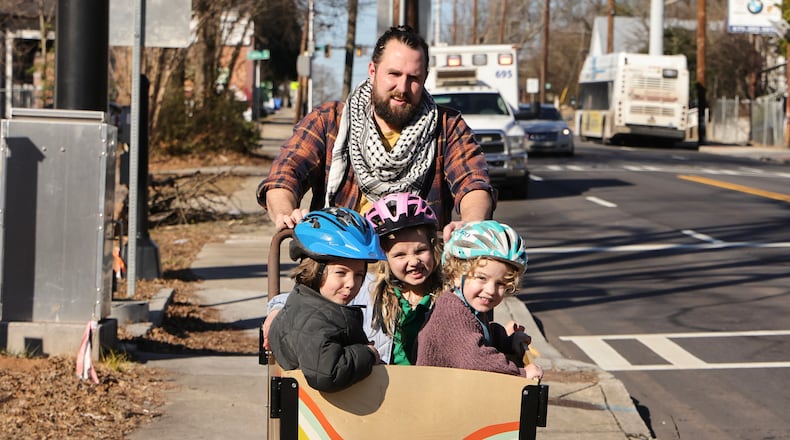A program using cameras to ticket speeders in 10 city of Atlanta school zones has raked in nearly $1.6 million since the program began issuing tickets in September.
About 41,700 speeding citations were issued in the school zones during the three-month period beginning Sept. 18, the first day speeding tickets were issued after an initial warning period, according to documents obtained and reviewed by The Atlanta Journal-Constitution.
The program has drawn support from some neighborhood leaders and parents of school-age children who say it’s making streets safer to cross. It also has confused some residents who have received tickets in the mail and aren’t used to the slower speed limit in their communities. The program has also raised questions about how the city and APS will spend the money they collect.
More than 15,800 citations were issued in a single school zone, near Gideons Elementary School in South Atlanta, over the three-month period — more than twice as many as the zone with the second-highest number. Atlanta Public Schools is in the early stages of expanding the safety program to as many as a dozen other school zones in its next phase. The hope is that the tickets will reduce the number of crashes and injuries caused by speeders in areas where children walk to school.
The program started Aug. 18 with a 30-day period of warnings before it began generating tickets of $75 for first offenses and $125 after that. Verra Mobility, an Arizona-based company, has installed and operates the cameras. When the company’s technology clocks a driver as speeding, the cameras capture images of the car and its license plate.
The Atlanta Police Department then reviews the event to determine if a violation has occurred.
For cars traveling faster than 10 mph over a school zone’s speed limit, the registered owner of the car receives a ticket in the mail. Car owners can appeal by testifying that they were not the driver behind the wheel or by showing their car had been reported stolen previously.
Under a 2018 state law that allowed schools to deploy automated speed-detection cameras in school zones, a driver can be cited for speeding only on a school day and only within one hour before or after either the start of the day’s classes, or the last bell of the school day. The city school zones have flashing lights warning people that the speed limit is 25 mph during those hours.
The law requires schools to apply for a speed camera permit with the Georgia Department of Transportation. Schools in more than 50 Georgia counties have active permits, including in Fulton, DeKalb, Gwinnett, Clayton, Henry and Cherokee.
The speed cameras near Gideons Elementary in Atlanta’s Pittsburgh neighborhood are along busy Metropolitan Parkway Southwest, a couple of blocks west of the school. Those cameras were responsible for far more citations than those at any of the other nine school zones during the first three months since fines started being issued.
Jessica Cole, who lives in Adair Park on the west side of Metropolitan Parkway, used to cross Metropolitan every day while walking her son, now in the first grade, to Gideons Elementary.
“There were a few times I thought we were going to get hit by a car,” said Cole, who noted that crossing Metropolitan feels much safer since the speed cameras turned on. “I am very glad that they’re there. Cars are actually stopping now.”
Brendan Horgan, another Adair Park resident, takes two of his three children to school every morning on his cargo bicycle. He also said the speed cameras seemed to have slowed things down, though he wouldn’t feel comfortable with his kids crossing Metropolitan without him.
“There’s quite a few people who speed right through there,” he said.
Speaking of all 10 school zones, APS spokesperson Seth Coleman said the school district’s police officers “have observed drivers slowing down and being a lot more careful driving through these speed zones than they have in the past.” He referred other questions to the Atlanta Police Department.
Atlanta police Maj. William Ricker, commander of Zone 3, which includes the Gideons speed cameras and the school zone for Cleveland Avenue Elementary School, noted that one reason Metropolitan is so busy is because it’s a “go around when you have interstate problems.”
He said the flashing signs warning drivers of the Gideons speed zone are highly visible and noted that, to get a ticket, you have to exceed the lowered 25 mph speed limit by more than 10 mph.
“Obviously we want it safer for the children going to and from school, so if that’s what we’re getting out of it, then it’s a plus,” Ricker said.
Reginald Rushin is chairperson for the Neighborhood Planning Unit that includes the speed cameras near Fickett Elementary School in the Ben Hill area of southwest Atlanta.
Rushin said he has heard from a couple of seniors who were confused when they got tickets in the mail. But he supports the speed cameras on Fairburn Road SW near the school that have generated 3,455 citations over the three-month period last year.
“My take on it is I think that having that camera there is a good thing because you do have some kids walking and you need to have people slow down,” he said. “It’s just a matter of people paying attention — if you see that light flashing, you may want to adhere to that school zone.”
Of the roughly 41,700 speeding citations issued during the three-month period, about 45% have been paid, said Valerie Schneider, a spokesperson for Verra Mobility.
For each paid ticket, $25 goes to Verra Mobility, with the city getting 66% of the remaining revenue and APS 34%.
Coleman, the APS spokesman, said revenue from the tickets will go “back into our funds for safety apparatus.” City officials said only that the money would go toward “local law enforcement or public safety initiatives.”
Jason B. Allen, executive director of Lillie’s Foundation, a nonprofit that supports grandparents and seniors raising school-age children, would like to know more specifically how the funds will be used and whether or not they will support safe routes to school.
Credit: Provided
Credit: Provided
Some residents have told Allen that they asked for sidewalks in their neighborhoods and have been given speed cameras instead.
“What is that money actually doing to help?” asked Allen, a former APS teacher who is an organizing director for the National Parents Union and a past candidate for the Atlanta Board of Education. “How much of those dollars are going to build sidewalks?”
He also noted that lots of low-income residents live near Gideons Elementary and some of the other school zones.
“Now we are taxing working families mostly on main streets for people going to and from work in areas where there are not proper sidewalks,” Allen said.
Coleman said the school district is in the beginning stages of expanding the speed camera program to another 10 to 12 school areas. But he said APS is still collecting traffic data and has not yet decided on the full list of schools.
The school district, he said, might be ready to apply for those permits this spring.
About the Author
Keep Reading
The Latest
Featured




